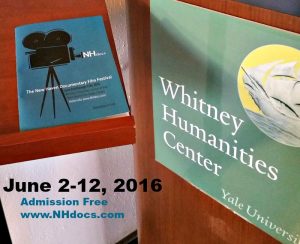
Some insights shared, and reflections on, panel at NHDocs with filmmaker Gorman Bechard, cinematographer Adrian Correia, Producer Colleen McQuaid, and sound recordist Aaron Miller .
My expectations:
The discussion would be specifically about Guerrilla film-making as a form of independent film-making characterized by low budgets, skeleton crews, and simple props using whatever is available. The panel’s focus, however, was documentaries. Some insights apply to both.
Finding the Story: You never know what story you are going to get so choose a topic that has meaning to you (and a potential group of viewers with similar interests). The story evolves (let it, and ‘serendipity’ work, for you).
Story Stages: The Plan. The Shoot. The Edit (Take out what does not move the story forward. Avoid “Lather, Rinse, REPEAT”). The Yellow Pad Screening (1st cut showing; feedback). The Documentary.
Your subjects will give you what they got (authentic voice); if they feel respected, have time to become familiar with the camera, experience an interview which is more like a conversation and understand you will not let them look bad (unless badness is what the story is about.) The same insights we share #WPAA-TV about Citizen Media Making.
Style: Consider a hybrid format: apply narrative techniques to frame the story and do not chain yourself to ‘Fair & Balanced’ unless authenticity, integrity and reliability are part of your purpose.
The Production: Schedule, Budget, Crew The schedule needs to be known by everyone and have realistic timelines. If you can not pay the crew, budget & schedule for feeding them. Anticipate some hiccups and diversions but reinforce the arrival time of all crew members. Know the crew and if everyone is new to each other be sure that introductions include some reference to skills but clearly establishes project roles. Encourage everyone to pitch in. Remember: it is best to invest time to “get it right” during the shoot unless the fix is simple in post (trust camera guy with edit experience when deciding) and audio is the least fixable/might as well be impossible element to fix. Embrace natural light.
Production Admin: Mitigate risks & leverage for marketing
Subject Releases: These should be simple and captured both in writing and on film; such that subjects identify themselves and acknowledge they are being filmed for the specific project.
Contracts: Plain Language.
Insurance: Errors and Omissions (big risks, then budget this)
Fair Use: Any copyrighted content sampled without permission Must be to “Illustrate a Point” To be clear: Music for the soundtrack in not illustrative.
Funding through crowd-sourcing (30 days max):
- Fund in stages
- Your supporters need to give thru crowd-funding to get momentum going. You need more than these supporters which is why you promote.
- Heavily promote engagement the 1st 14 hours.
- Never start crowd-funding on a weekend. Always a Tuesday or mid week launch. This process is to the minute (plan to be awake and engaged in the last few hours).
- Be sure supporter perks and donation levels cover the cost to you for the perk AND help finance the project.
- Video promotion: Keep quality high. It creates expectation for the film.
- Expect content to be pirated so safeguard your story; carefully share before the Trailer is released.
- You want the Trailer Shared so make that easy to do.
- Remember: Crowd-sourcing has costs: Build them into your budget. It is 1099 taxable income.
Distribution: If more than an act of love or a student project.
- YouTube and Vimeo are last resort distributions.
- Know what your distribution goals are in the planning and budget stages.
- Consider your local Community TV Station for your Yellow Pad or Final Release. Some stations like ours do not require 1st play for films with festival submission plans. If you make such a plan you can use Community TV equipment for free: Here we loan with a credit card release DSLRs, light kits, Gopros, Movi 5, Zoom H5N and more.
NHdocs came together in 2014 when four filmmakers from New Haven gathered together for the first time . . . in Missoula, Montana. This is year three. Same locations and timelines in process for year four.
